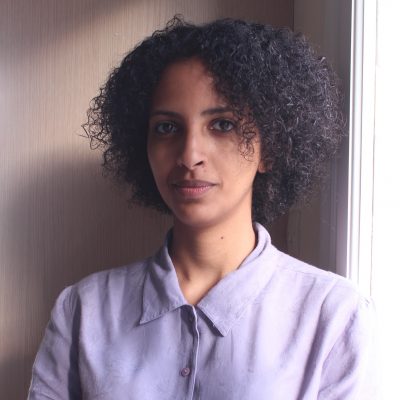Article
Exile is not a singular moment but often rooted in the past, connected to experiences with gender, sexuality, migration, and beyond. “The Words: On Memory, Temporalities, and Exile” is a project exploring stories of political imprisonment and exile in Syria and the diaspora. The project culminates in a multimedia essay on negotiating memory in the Syrian context and a community platform called „Mudakhalat“ (Arabic for contributions) that connects discourses, bridging the gap between Syrians inside and outside the country.
Assaad begins by exploring their own family and family friends’ stories, expanding to broader exile narratives that challenge romanticized or overlooked portrayals and address their erasure from collective memory. They question how perspectives shift over time and across places, engaging with Eurocentric narratives that often cast exiles as mere victims and victims as mere objects. This approach reframes questions about Syria, aiming to understand them through the complexities of exiled memory, as well as exile as a social and political reality both within and outside of Syria.
Assaad’s initiative targets politically engaged individuals aged 22-35 and those with personal migration experiences, while also appealing to a broader, intergenerational audience. It collaborates with advocacy groups, educational institutions, and media organizations to reach these communities.
The project will conclude with an online event in March 2025, where Assaad will showcase their findings and works developed through the fellowship. This event will feature an artistic and discursive program centered around Syria, exploring themes of memory, prison, and the pressing questions that arise after the fall of Assad.
Project Development
After the fall of the Assad regime in Syria, some of our fellows, as part of their work on Syrian memory cultures, started a group to navigate this change collectively, which led to the creation of the social platform Mudkhalat. Mudkhalat was launched as a collective effort, initially formed by Syrians in the diaspora to bridge our experiences. With the fall of the regime, the group now aims to extend this bridge back home.
Events
Launch Mudakhalat
Over the past decade, millions of Syrians have built their lives outside the country. As Syria enters a new phase, Zain is launching a series of online events to explore initial ideas, challenges, and opportunities for the role of Syrians in the diaspora in shaping the future of their country. They also aim to focus on building bridges between Syrians inside and outside Syria.
Dates and location: March 10 & 12, online
Time: 7:00 PM Damascus Time (UTC+3) | 5:00 PM Central European Time (UTC+1)
Language: Arabic
In these sessions, they will explore the transition from civil activism under Assad’s rule to the current phase and examine the role of the Syrian diaspora today. The event will also feature a program on memory politics in Syria post-Assad, marking the closing of Zain Salam Assaad’s participation in the Humanity in Action Fellowship 24/25. Registration is required.
Speakers:
- Salma Sayyad – Representative of the Nisan Cultural Forum and activist in civil and feminist work within Syria.
- Mohammad Kulthum – Executive Director of Naseej Foundation in Syria and civil society activist inside Syria.
- Leila Kayali – Member of the Network for Change in Syria, working to activate political engagement among Syrians abroad.
- Moderated by: Journalist Zain Salam Assaad
Other Updates
In November 2024, Zain wrote an article for ITEM magazine titled Artige Migrant*innen haben kein Gedächtnis (Good Migrants Have No Memory). The release party or Ausgabe #6 -artig would take place in December 2024 with the possibility to get a copy. Here’s a short excerpt:
„Wenn Menschen über Deutschland als Einwanderungsland sprechen, wird selten die Vergangenheit diasporischer Gruppen als Hauptaspekt der Migrationserfahrungen thematisiert. Wenn überhaupt, wird das entweder bemitleidet oder als importiertes Gewaltpotenzial geframed. Die Vergangenheit, sei es im Krieg, auf der Flucht oder anderweitig, wird zu einer kleinen Nebensache. Ein lineares Verständnis von Erinnerungspolitik dominiert und ignoriert die Schicksale und Kontexte aller anderen Erinnerungen, die Menschen mitbringen.“
English translation: “When people talk about Germany as a country of immigration, the histories of diasporic groups are rarely considered central to the narrative of migration experiences. When mentioned at all, they are either framed as objects of pity or as imported sources of violence. The past—whether shaped by war, displacement, or other circumstances—is relegated to a minor detail. A linear understanding of memory politics dominates, ignoring the complexities and contexts of the diverse memories that people bring with them.
In December 2024, Zain called their father, sharing that “the [Syrian] dictator’s gone.” In the upcoming weeks, Zain shared about the changes in Syrian government more publicly – for example through Freitag, a German digital newspaper. The article (in German) is available here.
In February 2025, Zain published a roundtable discussion, titled “Spaces Beyond Tensions: A Look at Migrant-Led Initiatives in Today’s East Germany” for Reset! a European network initiated by Arty Farty, gathering and supporting independent cultural and media organisations. Zain contributed with a relevant article to the discussion.
Updated March 2025




